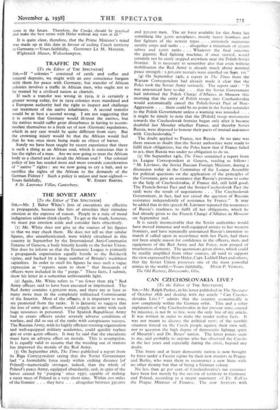THE SOVIET ARMY
[To the Editor of THE SPECTATOR]
SIR,—Mr. J. Baker White's lists of executions are effective as propaganda, because like lists of atrocities they stimulate emotion at the expense of reason. People in a state of moral indignation seldom think clearly. To get at the truth, however, we must put emotion aside and consider facts objectively.
(t) Mr. White does not give us the sources of his figures
so that we may check them. He does not tell us that similar figures, also unauthenticated, were widely circulated in this country in September by the International Anti-Communist Entente of Geneva, a body bitterly hostile to the Soviet Union. Nor does he inform us that the Economic League is primarily a propaganda organisation equally hostile to the Bolshevik regime, and backed by a large number of Britain's wealthiest capitalists. In order to swell his figures he uses such a vague expression as " reports seem to show " that thousands of officers were included in the " purge." These facts, I submit, show his letter in a somewhat unfavourable light.
(2) Again, Mr. White refers to " no fewer than 384 " Red Army officers said to have been executed or imprisoned. The Red Army contains 1,300,000 men, and there are at least as many more men in the completely militarised Commissariat of the Interior. Most of the officers, it is important to note, are promoted from the ranks. It is fantastic to suggest that the loss of some 40o officers would cripple an army with such huge resources in personnel. The Spanish Republican Army had to create officers under severely adverse conditions of warfare, and did so out of the ranks with conspicuous success. The Russian Army, with itshighly efficient training organisation and well-equipped military academies, could quickly replace 400 or even 4,000 officers. It may be said that the executions must have an adverse effect on morale. This is assumption. It is equally valid to assume that the weeding out of traitors has improved the morale of the Red Army.
(3) On September 26th, The Times published a report from its Riga Correspondent saying that the Soviet Government had " a formidable force ready within striking distance [of Poland]—numerically stronger, indeed, than the whole of Poland's peace Army, equipped abundantly, and, in spite of the havoc caused by purging ' since 1937, capable of making a nasty mess of Poland in a very short time. Within 200 miles of the frontier . . . they have . . . altogether between 330,000 and 35o,000 men. The air force available for this Army has something like 3,000 aeroplanes, mostly heavy bombers and fast fighters of the newest types . . . extremely numerous cavalry corps and tanks . . . altogether a minimum of 50,000 sabres and 2,000 tanks . . . Whatever the final outcome the gigantic Red fighting machine, if once started, would certainly not be easily stopped anywhere near the Polish-Soviet frontier. It is necessary to remember also that even without mobilisation the Red Army is already much above nominal peace strength : 1,300,000 recruits were enrolled on Sept. 1st."
(4) On September 24th, a report in The Times from the Warsaw Correspondent had already made it clear that the Poles took the Soviet Army seriously. The report said : " It was announced here to-day . . . that the Soviet Government had informed the Polish Charge d'Affaires in Moscow this morning that the entry of Polish troops into Czechoslovakia would automatically cancel the Polish-Soviet Pact of Non- Aggression . . . there could be no point in the Soviet reminder to the Polish Government unless a warning was intended . . . it might be timely to note that the [Polish] troop movements towards the Czechoslovak frontier began only after it became doubtful last Monday whether France, and thereby Soviet Russia, were disposed to honour their pacts of mutual assistance with Czechoslovakia."
- The doubt applied to France, not Russia. At no time was there reason to doubt that the Soviet authorities were ready to fulfil their obligations, but the Poles knew that if France failed to act, then Russia was under no obligation to do so.
(5) On September 24th, The Times contained a report from its League Correspondent at Geneva, reading as follows : " M. Litvinov, the Soviet Russian Foreign Minister, during a discussion today in the Committee of the League Assembly for political questions on the application of the principles of the Covenant, gave an assurance that Russia's promise to come to the help of Czechoslovakia, if France did, still held good. The French-Soviet Pact and the Soviet-Czechoslovak Pact (he said) were the result of negotiations . . . The Czechoslovak Government, in fact, had not raised the question of Russian assistance independently of assistance by France." It may be added that in this speech M. Litvinov repeated the assurances of Russia's readiness to fulfil all her obligations, which he had already given to the French Chargé d'Affaires in Moscow on September 2nd.
It is surely inconceivable that the Soviet authorities would have moved immense and well-equipped armies to her western frontiers, and have repeatedly announced Russia's intention to march if called upon in accordance with her Pacts, had there not been ample reason for confidence in the officers, men, and equipment of the Red Army and Air Force, now purged of treacherous elements. The quotations given above, which could be readily amplified from other sources, all tend to support the view expressed by Herr Hitler, Capt. Liddell Hart and others, that the Soviet Union possesses one of the most powerful
armies in the world.—Yours faithfully, HUGH P. VOWLES. The Old Rectory, Harescombe, Glos.










































 Previous page
Previous page